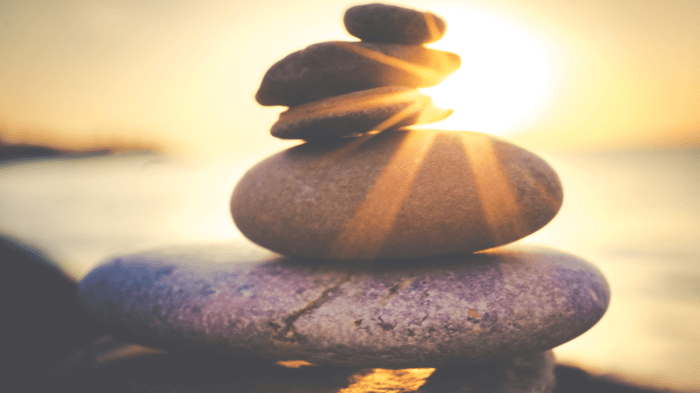
Reduce stress - The 20 most effective tips against stress
You can reduce and relieve stress with these simple tips. Learn which methods suit you best.
Stress is part of life and cannot always be avoided. But what can you do when stress overwhelms you, paralyzes you or even makes you ill? We show you ways to better deal with stress and successfully reduce it.
Positive stress increases alertness and promotes productivity. Anticipation or ambition for things, for example, motivates people, and by mastering tasks, other positive experiences boost self-confidence in the end. However, if the stress level is too high, we feel overwhelmed. If the stress lasts for a long time, recovery is too short or dealing with it is disturbed, it becomes increasingly difficult to reduce stress. Constant availability, anxiety at work or time pressure in our free time make it more difficult to reduce stress. If the body enters a permanent state of alarm, the possible consequences of stress range from burnout to depression and organic diseases.
What is stress?
Stress stands for physical and psychological reactions to external pressures. With stress reactions, the body wants to speed up decision-making in the face of danger. Stress mainly arises when we have the feeling that we are not up to a task. When this happens, processes in the body change. Adrenaline and noradrenaline are released. Some bodily functions such as heartbeat and breathing are accelerated, and others are slowed down.
Above all, however, every person experiences stress differently. What doesn't interest one person creates tension in another. How we deal with stress also varies. While some people relax quickly when they do certain things, others have difficulty getting out of the thought spiral.
Stress - symptoms and triggers
At the latest, if stress prevails even during leisure time or if the quality of sleep decreases, regeneration falls by the wayside and coping with stress becomes more difficult. If you want to reduce stress, you have to listen more closely to recognize symptoms and stress triggers. Long-lasting stress, in particular, has many faces. Everyone reacts differently to chronic stress, from circulatory problems and joint pain to gastrointestinal disorders and skin reactions. Well-known symptoms such as sleep disturbances and exhaustion occur frequently, but they are only one of many symptoms of stress.
To effectively reduce stress, it is essential also to know the triggers. A stress diary can help recognize stressful situations and manage them more easily in the future. Reflecting on stressful situations also helps to identify negative patterns that reinforce stress, for example, through one's reactions.
Reduce stress - 20 things that help with stress
Reduce stress: The earlier something is done, the easier it is to relieve stress.
Stress has a significant impact on well-being. The sooner something is done, the easier it is to relieve stress. Prolonged stress can cause severe exhaustion, which goes beyond a state of fatigue. There is short-term and long-term stress management. While you can use some techniques in acutely stressful situations to reduce stress, long-term techniques can help you prepare for stressful situations. Long-term strategies should always be the basis of healthy stress management.
#01 - The basis - accepting stress
Negative stress rarely fits into life. If you find it challenging to accept stressful situations, extra pressure builds up inside you, and stress relief becomes more difficult. There is nothing wrong with admitting when you are overwhelmed. On the contrary! It happens to everyone and is the first step towards a healthy approach to stress.
#02 - Mindfulness - Responding to stress in the right way
It is like stress to speed up reactions. This dates back to when people had to act quickly in the face of danger to survive. However, stress still increases the need to act today. Interrupt thoughts about to-do lists and what you need to get done today. Instead, be mindful and focus on the here and now. More pressure will automatically build up if you do one thing while already thinking about the next thing.
#03 - Breathe deeply
Stress changes the way we breathe. Breathing becomes shallower in stressful situations, which means the chest is constantly under basic tension. You can breathe more deeply in stressful situations and take more time to exhale than inhale to relieve stress. This automatically relieves tension in the chest. Breathing techniques also help you stay mindful by concentrating on your breathing and not getting lost in your thoughts. The most straightforward breathing technique is to count your breaths. When you have counted to 10, start again from the beginning. You will see that this is not so easy in stressful situations.
Tip: The best way to reduce stress with the help of breathing is to also breathe into your belly. To do this, stretch your belly out when you breathe in and pull it in again when you breathe out; this takes additional tension out of your chest.
#04 - Enough sleep - For emotional stability
Tired people react more emotionally and are much more susceptible to stress. Deep sleep is a natural inhibitor of anxiety and restlessness. Especially if sleep disorders have already developed due to stress, it becomes increasingly difficult to keep up with the sleep workload. However, restful sleep is one of the best ways to reduce stress. Make sure you have good sleep hygiene, for example, by keeping your bedroom at the right temperature (16 to 18 degrees) and well ventilated, having regular bedtimes, and giving yourself enough time to rest before going to bed.
#05 - Yoga
Yoga effectively provides a good work-life balance. Yoga aims to bring body and mind together. Through mindfulness of movement, breathing and thoughts, stress is effectively reduced. Strengthening and at the same time mobilizing (stretching) asanas (exercises) to enhance also the supporting muscles and at the same time release muscular imbalances (tensions). Daily 5 to 10 minutes of yoga in the morning or evening effectively reduces stress and promotes concentration and vitality.
#06 - Balance through hobbies
Distance from stress brings calm, which is best achieved through a balance, such as hobbies. Especially hobbies that strongly contrast to the stress triggers bring a good balance and effectively reduce stress.
#07 - Cannabidiol
CBD oil has an antispasmodic, anti-inflammatory and pain-relieving effect on the body. That is why many people use it who suffer from migraines or have severe cramps during menstruation. Some people also rely on the active ingredient of the hemp plant for skin problems such as acne. CBD is also used to treat psychological complaints such as depression and stress symptoms. Because: It supposedly brightens the mood, ensures good sleep and helps against anxiety. Some even say that cannabidiol has a therapeutic effect on epilepsy and cancer. Check our store for options or contact us.
#08 - MBSR
MBSR is Mindfulness-Based Stress Reduction. The exercises consist of meditation, yoga and mindful body awareness. The effectiveness of stress reduction through MBSR has been extensively studied and proven in recent decades. Most health insurance companies therefore also subsidize MBSR courses.
#09 - Saying "No!"
Reduce stress: People who are overwhelmed and have trouble saying "no" are more likely to be stressed.
Stress reactions are the result of being overwhelmed. Especially for people who are bad at saying "no" and are already stressed, more and more stress builds up with each additional willingness to help. Giving refusals becomes more and more critical.
#10 - Social contacts
A stable social environment facilitates stress reduction. People you can open up to are particularly helpful. However, social contacts often come up short during stressful phases of life. If you then try to compensate for all the things you missed during the week at the weekend and also meet important people in between, such encounters will be anything but restful. Consciously take time with people who are good for you and helpful to you to relieve stress.
#11 - Call it a day
Don't take work home with you and consciously call it a day after work. Consciously put your work thoughts aside after working hours and don't attend to them again until the next time you start work.
#12 - Avoid false stress management
Wrong ways of coping with stress are usually learned patterns of behavior that harm other areas of life. Behaviors for incorrect dealing with anxiety can be resigned, avoidant or even aggressive. Such behaviors for incorrect coping with stress range from total suppression of problems to increased addictive behaviour, to a radical rejection of tasks or even bullying other people as compensation.
#13 - Progressive Muscle Relaxation (PMR)
Progressive muscle relaxation is a technique in which muscle groups are systematically tensed and relaxed. Body and mind influence each other. Progressive muscle relaxation uses this in the other direction. The exercise takes about 20 to 30 minutes. During this time, you move from muscle group to muscle group, tensing each group individually for 10 seconds and then relaxing them for about 30 seconds. Start with the arms, then the neck and shoulder muscles, the facial muscles, the abdomen, and finally the legs and feet.
#14 - Digital Detox
The average smartphone user unlocks their phone about 80 times a day - roughly every 12 minutes. The reason: digital platforms have the motivation to get as much time and attention from users as possible. Clicks and time spent on apps and websites are the currency in digital business. Above all, the fear of missing out is stoked. Constant accessibility in combination with sensory overload due to an abundance of information becomes a burden and creates stress. Reduce stress by consciously taking digital time-outs. Switch off your mobile phone and laptop regularly and use offline time to relax. Also, consciously take time for your devices, for example, by only checking your emails or social media once a day. This can be very unfamiliar at first, but it creates healthier routines and reduces digital stress over time.
#15 - Sport
Sport accelerates stress reduction by increasing the release of endorphins and serotonin. Stress hormones are thus reduced more quickly, and tensions are eased through activity. Those who relax on the couch stay on top of their stress longer. In addition, the body develops better stress resistance, primarily through regular exercise. Breathing becomes more profound and the vegetative reactions, such as increased heart rate and blood pressure, are less pronounced.
#16 - Meditation
Meditation is one of the easiest relaxation techniques to get out of spirals of thought. When meditating, the main focus is on mindfulness. It is tried not to evaluate arising thoughts to avoid or dissolve chains of associations. Mindfulness is directed towards the breath, the body, or a mantra during meditation. If thoughts arise, mindfulness is directed back to the point of mindfulness.
Meditation requires some practice. Restless people, in particular, find it difficult at first to interrupt thoughts and realign mindfulness. A short daily meditation of about 10 minutes helps develop the necessary routine quickly.
#17 - Adjust time management
Incorrect time management can also create stress. Too many tasks and no recovery time can quickly overload you. Separate the important from the unimportant and cross off tasks when you are busy to reduce stress.
#18 - The benefits of the anxiety band
Anti-stress bands work perfectly when worn as a bracelet. The power of bracelets lies in their ability to carry and transmit specific energies. When you wear an anxiety band as a bracelet, you are choosing a practical and original way to benefit from the powers of Quantum 3.
#19 - Power napping
Napping during the day is not for everyone. However, many swear by the energy boost from short power naps during the day. Give it a try. Make sure, however, that your nap lasts no longer than 10 to 20 minutes. This is when the body begins to induce the sleep phases through sleep hormones. Waking up is then particularly difficult.
#20 - Proper nutrition
Diet also plays a crucial role in stress levels. An unbalanced diet can cause nutrient deficiencies. In addition, fatty and sugary foods can make you tired, as insulin responses are more robust in both directions. However, poor nutrition is often the result of stress, creating a negative cycle and making it harder and harder to relieve stress in the long run. In addition, digestion and metabolism deteriorate, primarily due to long-term stress. Therefore, make sure you eat a balanced diet and take time to prepare your food. Drink plenty of fluids to stimulate your metabolism and include vegetables and whole grains in your diet. Adaptogens are biologically active plant substances that can additionally help to increase stress resistance naturally. The effect of adaptogens has already been proven in several studies.




